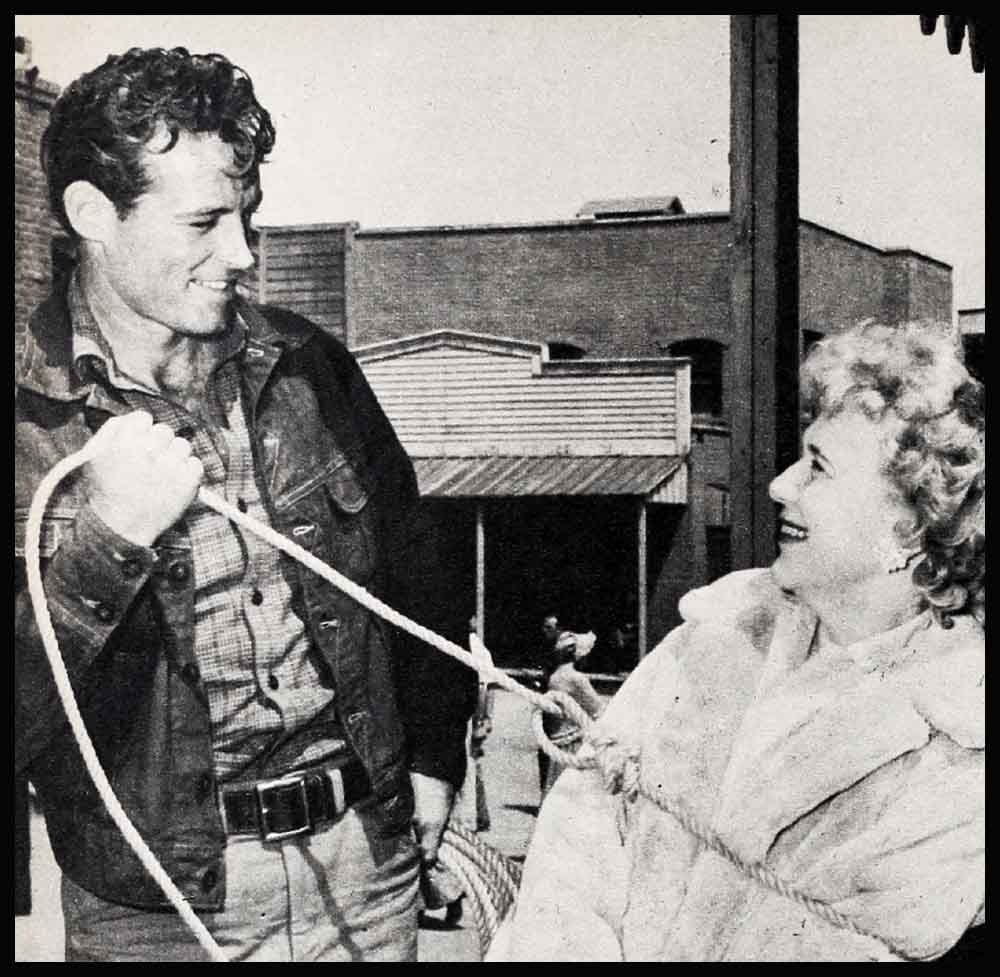
Glamour Gab Of Hollywood
When I visited the set of “Reprisal” this month, to see Kathy Grant, I found myself lassoed by Guy Madison. This fellow keeps on getting pleasanter and handsomer as he grows more in love with his wife Sheila and baby Bridget and more excited about the new baby.
During the war years, when Guy first came to Hollywood, a lot of superficial people thought he wasn’t very smart, just because he was shy. Now they know he’s smart, what with his own producing company, his marriage, his lovely home. Guy is delighted to have two leading women of the caliber of Kathy Grant and Felicia Farr in “Reprisal.” but he glows especially over the fact that his kid brother, Wayne Mallory, is in the picture, too. “You wait and see,” Guy insists. “He’s a much better actor than I am.”
Guy and I got to talking about the way that Kathy Grant stands. Just as Grace Kelly turns the simple act of walking into a thing of beauty, so Kathy makes standing absolutely eye-catching. This is probably because she started out as a ballet dancer, and besides, everything about this subtle girl is unique—particularly her intelligence. After talking to her for ten minutes, you know why she continues to hold Bing Crosby’s attention. I’m beginning to think that, if Bing does get Kathy to marry him, it will be just one more occasion when he is “Mr. Lucky.”
When a marital crash like Jeanne Crain’s and Paul Brinkman’s comes along, I really steam when I hear people say, “That’s Hollywood marriage for you.” Sure, it’s one type of nonworking Hollywood marriage. But before you start thinking Hollywood is always love’s undertaker, consider some of the other situations.
For instance, the Charlton Hestons, and Lydia Heston’s latest birthday present. Like most husbands, Chuck didn’t have the foggiest notion as to what to give his little woman for her birthday. He kept fussing and fuming until the lucky evening when he and Lydia went to see “The Birds and the Bees.”
In one scene, aboard ship, Mitzi Gaynor wore a doll of a suit, made of a wonderful light wool in a shade that was like creamy caramel, and collared and cuffed with dyed fox to match.
At the sight of it on the screen, Lydia Heston let out a gasp and, bless the man, Chuck heard her sound of rapture. The next morning, he turned up at Edith Head’s office at Paramount.

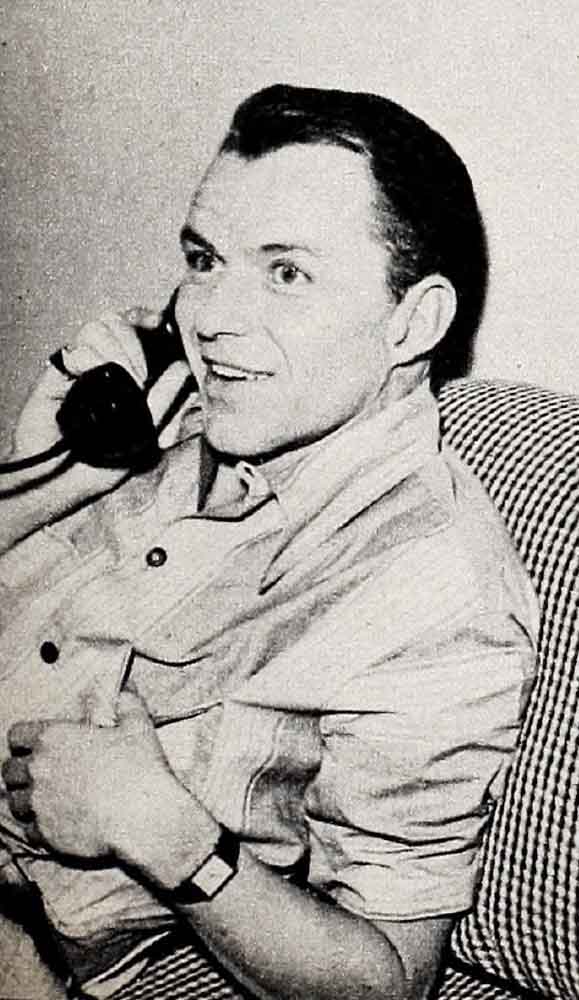
And Ruth Waterbury knew he’d be sure to see her in Spain!
Complicated as it is, perhaps the Sinatra-Gardner love is still “for real.” You’ve probably read that Frankie recently sent Ava a new Cadillac. What I don’t believe you’ve heard is that Ava persuaded U.A. to screen “The Man with the Golden Arm” for her in Madrid—at 2 A.M., so that no one would know about it. U.A. did just that, but they could hardly keep it quiet since, the next day, Ava went about everywhere saying. “He can do anything the best!”
By the time you read this, I’ll be in Spain, where Ava and Frankie will both be this summer. I’ll wager anything you like that they will get together. But for how long?
* A second wedding ring for Liz Taylor
* Hollywood glamour history recalled at Pickfair party
* A Waterbury prediction about Ava and Frankie
Of course, with Edie’s designing salary, plus the imported fabric and the specially dyed fox, that suit had set Paramount back about $1000. But, for Chuck, money was no object.
It took Edie only fifteen minutes to make another sketch of the suit, to fit Lydia’s proportions. In another five minutes, she had cabled France for more wool and had the furriers stirring their dye vats. Thus, on April 14, on location in Phoenix with her ever-loving husband, Lydia Heston was a happier wife than ever when she got the suit of her dreams.
Incidentally, Edith Head says that the most becoming way to wear those new inverted bowl hats is—to carry them! In my opinion, the only Hollywood belle who can get away with it is Dana Wynter. Her trick is to wear them with solid black, untrimmed, unjeweled sheath dresses.
Beverly Hills is one of the few spots in California where people go walking. and there’s never an hour of any day that you won’t run into top stars on Rodeo Drive out there.
Recently, I encountered Liz Taylor and Mike Wilding in a jeweler’s shop on Rodeo. Mike was buying Liz the most beautiful matching gold bracelet and earrings in a braided design, as an Easter present. Then Liz spied a wedding ring—wide, and in a rough gold design, rather like gold nuggets. As soon as he knew she wanted it, Mike grinned and happily bought it for her.
I am terribly fond of Liz, and I have a lively respect for Mike. Another of the stock arguments about Hollywood marriages is that they can’t survive when the wife’s career is more brilliant than the husband’s. This one has, and I think it always will.
Liz said to me that day, “Someday I’ll be old and my face won’t be anything a camera will care for. Much as I appreciate Mike and my children now, I’ll be more than grateful to them then. I’ll know I haven’t missed the great things in life for something as unimportant as a career.”
Tony Curtis has lost his head over his own success. That is, he’s really crazy about his new private office, now that he’s become his own independent producer. Meet him anywhere and he murmurs, a la Mae West, “Come up and see my office sometime.”
Janet did the decorating. It’s mostly in oyster white—the carpet, draperies, and the telephone—yet thoroughly masculine. It’s located in the Hecht-Lancaster building, and Tony will release his pictures through them, because he had such a happy time making “Trapeze” for them. Take my word for it, “Trapeze” reveals a new and even greater Tony. I think it will be one of the biggest smash successes of the past few years.
Nevertheless, Tony has notified all concerned that he will do nothing for nobody, no how, for the week before and after June 18. That’s when Janet expects their baby. “There’s no money in the world worth my being away from Janet at that time,” says Tony, glowing with love and anticipation.
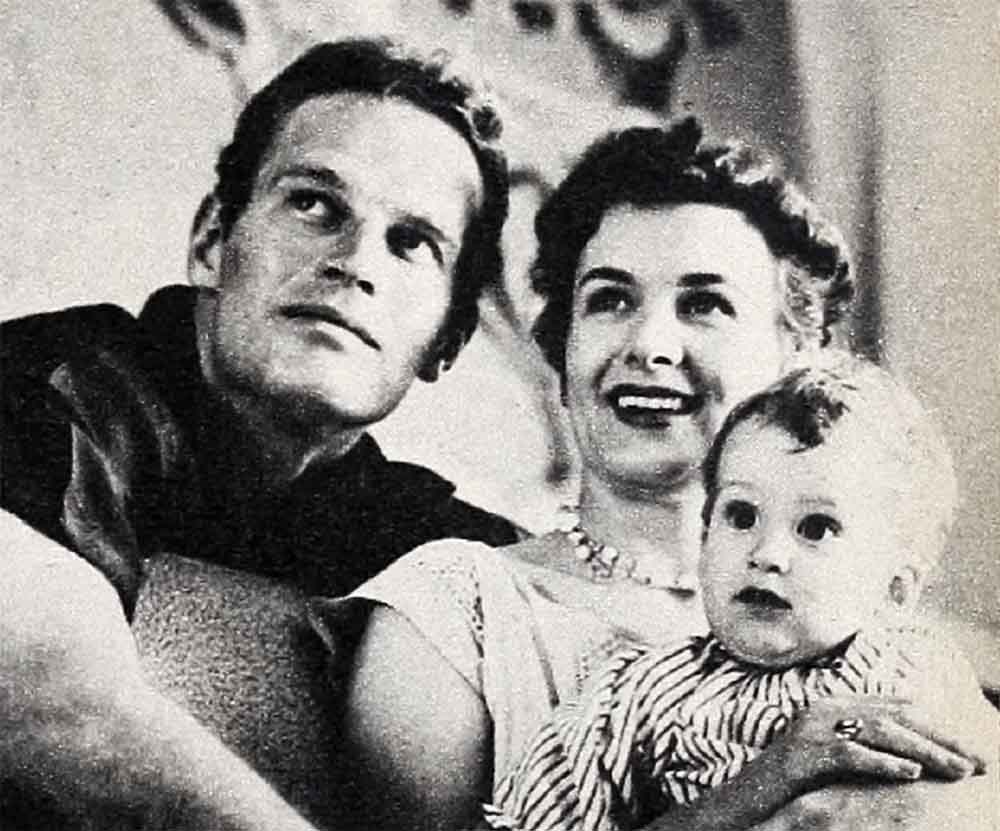
Happiest party ever given in Hollywood in the opinion of its oldest residents was the “Marty” party after the Academy Awards. At most Hollywood gatherings, the top producers gather with the other top producers, the top stars with other top stars. But this wasn’t true this particular evening. Nobody had been asked for “policy” reasons. If you weren’t an old and good friend of the Hecht-Lancaster-Borgnine faction, you didn’t get in, and if you were, you did—even if you were a janitor or sweeper at the Hecht-Lancaster offices, as a couple of the guests were.
There were some wonderfully dressed women there, such as Kim Novak in a beautiful printed taffeta outfit which was absolutely backless to her waistline. There were scads of handsome men, such as Jimmy Stewart and Gary Cooper. But it was Ernest Borgnine’s smile that lighted up the whole room. He sat with his arm around Mrs. Borgnine—whose figure can’t be remotely compared with Marilyn Monroe’s—and he beamed, not only with love of the whole world, but definitely of his wife, to whom he had paid such a charming tribute when he won his Oscar.
After having a few drinks, somebody dared to make a hint to Ernie that it might be nice if Mrs. Borgnine would reduce. Ernie just eyed him with that honest glance of his and said, “I’m the kind of a guy who likes to sit home every night and drink beer. If Rhoda was one of those thin chicks, she’d start reforming me. Everything’s perfect with us.”
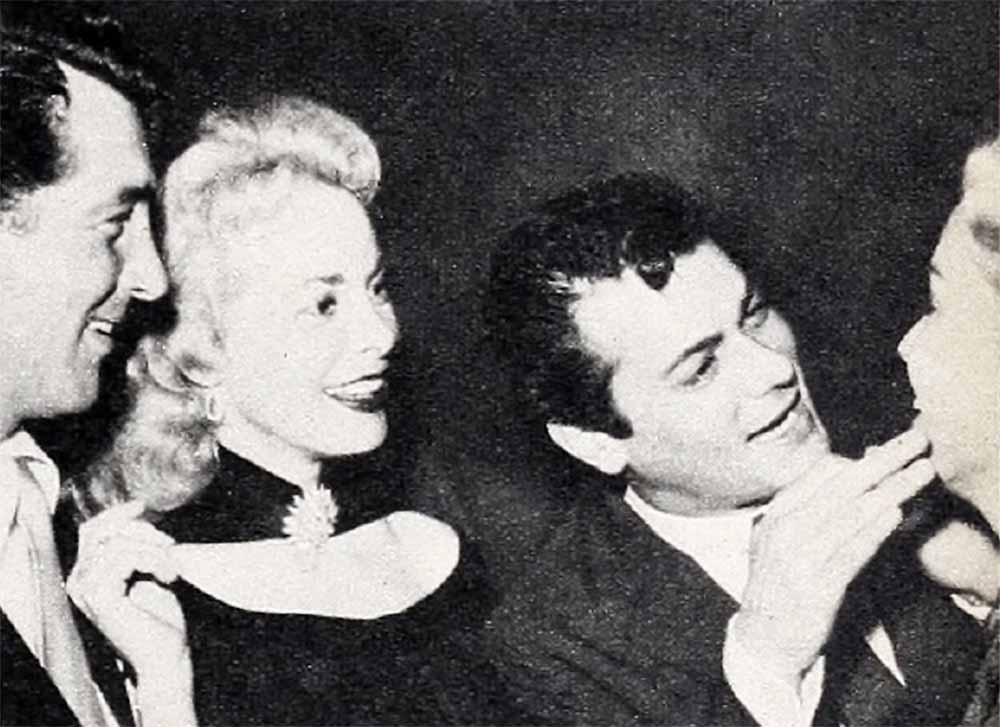
I didn’t think it was a happy party, the large gathering at Mary Pickford’s stately home, Pickfair, for the silent-screen stars. There was something all wrong about getting together people who kept saying, “Well, I haven’t seen you in twenty years.” Particularly when all that time they have been within a very few miles of each other.
Just about all the old stars were there—from Clara Kimball Young, Viola Dana and her sister, Shirley Mason, Ken Maynard, Harold Lloyd, and Buster Keaton up to Jack Oakie and Bill “Hopalong” Boyd. It never rains in California in late spring, but that Sunday a torrent decended, and the party had to move indoors. The Pickfair spaciousness absorbed five hundred guests with complete ease and Mary and Buddy Rogers were wonderful hosts.
I kept wondering, though, what made some guests look so much younger than the others, since all of them must be approximately the same age. Partly a matter of health, I suppose, but granting that, I finally decided it was a matter of style. Clara Kimball Young, for instance, although overweight, still looked beautiful. She was full of laughter and grace.
The same was true of Irene Rich, there with her talented daughter, Frances. She was beautifully gowned and groomed, her hair naturally silvered, and her conversation was of the present, not the dim past. Irene makes no pretentions to youth, but she possesses it. Recently she married again, a debonaire, fabulously rich man, and her home in Santa Barbara is one of the most beautiful in a community that specializes in beautiful estates.
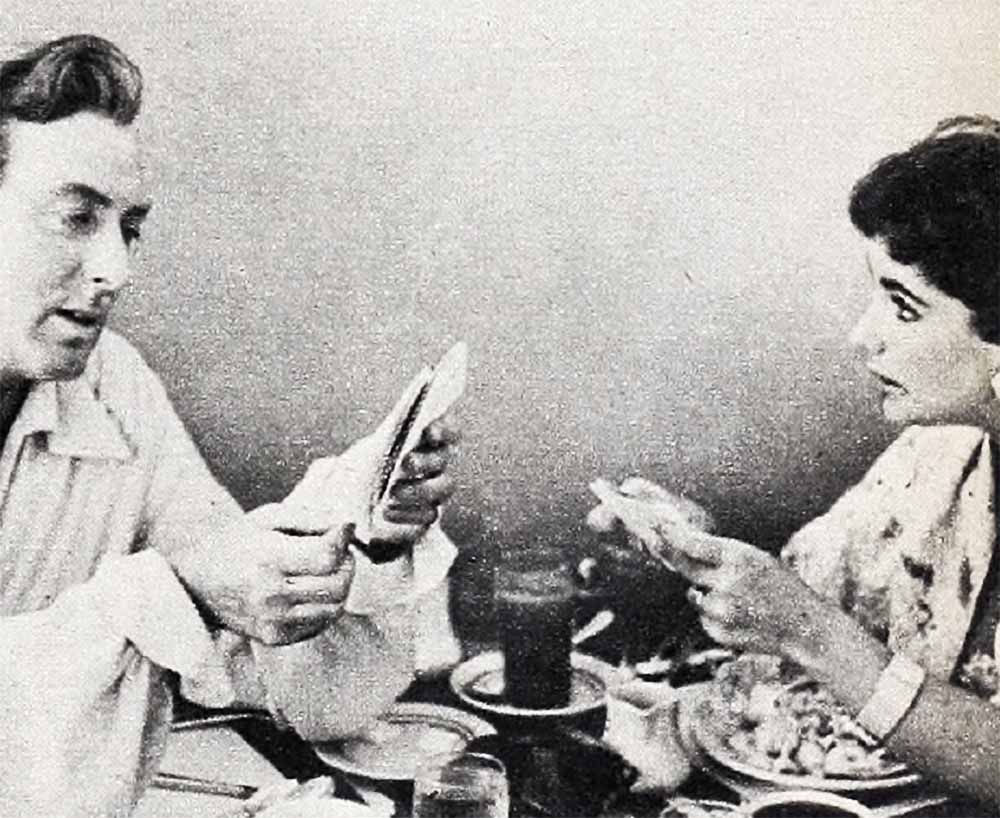
As I was leaving, a waiter handed me a copy of the guest list, and I was amused to note that it said “Louise Fazenda and husband” were among those present. Louise, who had presided over the tea table, is the wife of Hal Wallis, who is merely the producer of “The Rose Tattoo,” the Dean Martin-Jerry Lewis comedies, and the like. In the more than twenty years that he and Louise have been married, I’ll bet this is the first time that Hal has been anonymous.
There’s seldom a Hollywood party that doesn’t have some kind of theme. When Hollywoodians get together, they crave amusement. Thus, at the first party Dean and Jeanne Martin gave after making the whole town—and I hope themselves—happy by reconciling, the after-dinner fun centered around a hypnotist. (The Bridey Murphy influence at work.)
Tony and Janet Curtis were among the guests, and Tony was the first to volunteer to be hypnotized. No sooner had he said it than he was stretched out in space with nothing to hold him up except just his head on the back of one tall chair and his feet on another. Janet, who feared being hypnotized because of its possibly endangering her unborn baby, screamed when Valerie Allan accepted the hypnotist’s challenge to stand her pretty self plunk on Tony’s unsupported middle. Even that didn’t disturb Tony—which is probably the only time in his life that he wasn’t aware of a lovely girl being near him.
After the hypnotist woke up Tony, he next tried hypnotizing Dean Martin. All Dean did was fail fast asleep. “That’s no art,” snorted Tony. “The trick with this relaxed character is to keep him awake.”
The Jimmy Dean stories continue to come to light. I think the following one about Jimmy, Pier Angeli and Vic Damone is one of the most touching—and a tribute to all three of them.
To understand it, you have to realize that there are numerous people in Hollywood who sincerely believe that Jimmy might still be alive if he had married Pier. He adored her so that, if she had become his wife, she might have tamed his wildness.
On the other hand, friends of Pier’s think her mother had been right in discouraging this romance, arguing that Pier would have been nothing but miserable married to a genius. Of course, at the time he was dating Pier, few people had Jimmy spotted as a genius; “East of Eden” hadn’t yet been released.
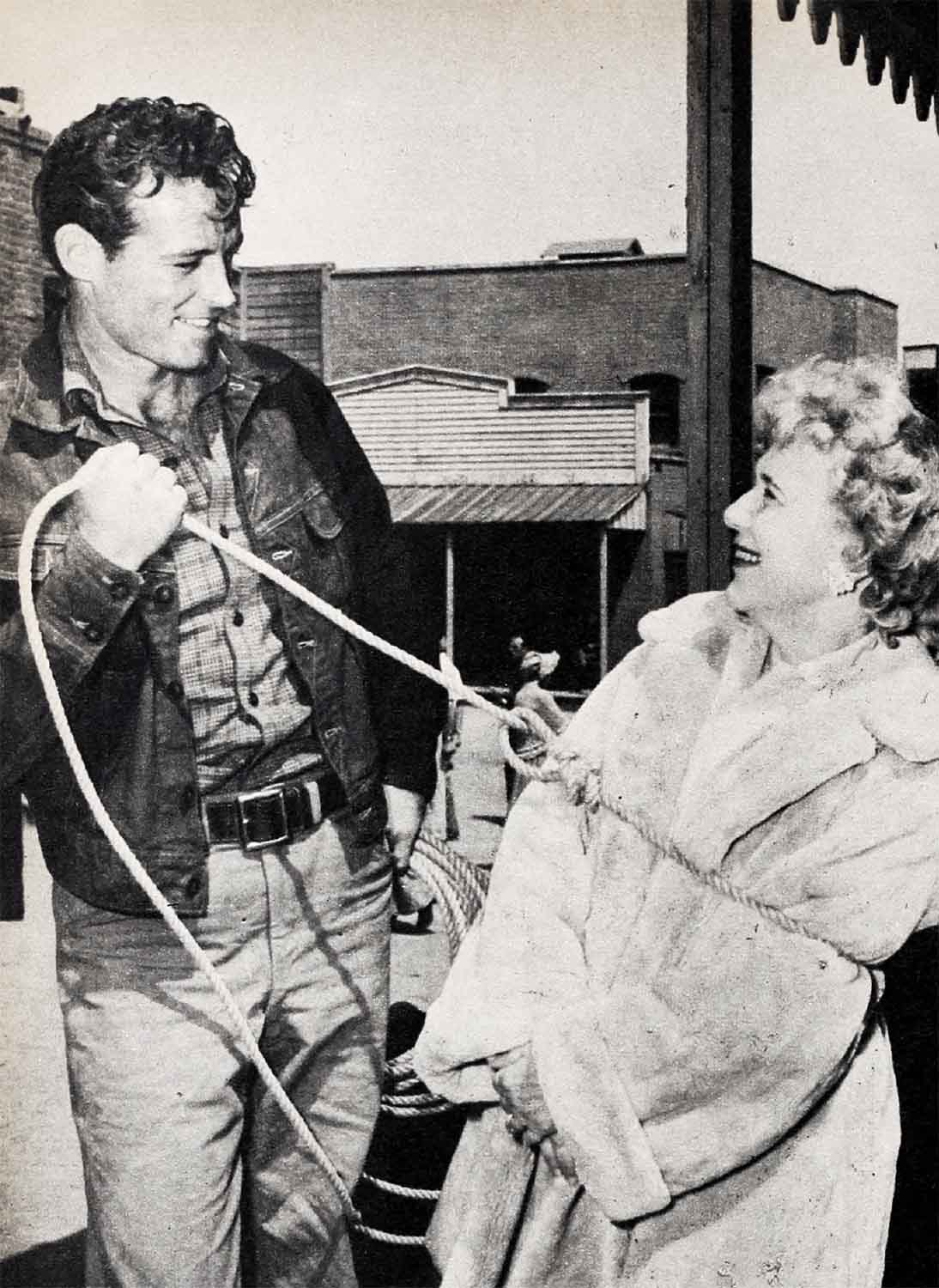
When Pier married Vic Damone, Jimmy parked across from the church on his motorcycle and watched, and he was obviously heartbroken. From that day on, his conduct became more and more reckless. He defied everything, and by the time he was making “Giant,” he was pretty close to impossible.
When Pier heard reports of this, she felt guilty. It was then her worshipping husband, Vic Damone, decided to see if he couldn’t straighten things out a little for her and for Jimmy, whom he had never met. So when Pier was sent out of town on location, Vic began haunting the spots where he knew Jimmy was seen. Finally one night, his vigil at a small Hollywood restaurant was rewarded when Jimmy came thundering into the parking lot on his motorcycle.
Vic got out of his car and walked toward Jimmy, meaning to introduce himself and then talk to him. But before he could say a word, he saw that Jimmy, peering from behind his thick glasses, had recognized him.
Without preliminaries, Jimmy said, “Is she happy?”
“Yes,” said Vic, “and she wants you to be happy, too.”
“You going to keep on making her happy?”
“For all my life,” Vic said.
With that, Jimmy broke into tears and jumped back onto his motorcycle. “Give her my love,” he said, and went thundering away. Neither Vic nor Pier ever saw him again.
When Audrey Hepburn was born, the fairy godmothers must have hovered over her cradle in clusters like grapes. For she walks in enchantment, this one, and her great fortune is to have found a husband like Mel Ferrer, who is as deeply romantic as she.
Last summer when I was in Rome, I ran into Audrey and Mel in the swank, crowded Hotel Excelsior, and they both promptly asked me to dinner. They took me to their honeymoon farm, far down the Appian Way, where Caesar’s army had marched so many centuries ago. And what kind of a completely peaceful, beautiful farm do you think Mel had discovered for his bride? A flower farm, so help me, and there they were in a setting of continuous perfume and enchanting moonlight. That evening, almost as soon as we had finished eating, Mel sent Audrey to bed. “Darling, you need your rest,” he said. Before she went, however, she insisted upon fixing some warm milk for him to drink later, to fatten him.
Now back in Hollywood, Audrey worries about Mel, who has just finished four films in a row, and who is again too thin. Mel, in turn, worried about her working in “Funny Face,” going to the studio mornings by taxicab or hired limousine. So recently he bought her a white Thunderbird. I live on the kind of a country road where an amateur driver can safely experiment. That’s how I happened to see Mel teaching, Audrey learning—and neither of them getting much of anywhere, between their stopping to pick wildflowers and to kiss one another.
When Dottie Lamour opened at the Statler Hotel in Los Angeles, Bob Hope attended with a big party, laughed the most, applauded the loudest, and finally got into the act to help put it across for this really super-swell gal.
Bob’s so often the greatest friend in such ways. Fame hasn’t spoiled him. His heart is always warm, and his humor is spontaneous.
That evening, for instance, being aware that this is an election year, Bob was telling about his first meeting four years ago with President Eisenhower. He’d gone to Washington for the Press Correspondents’ dinner and got the invitation to play in a golf foursome with Ike.
“Trying to tee off with the President of the United States looking on is a nervous thing,” Bob said. “I goofed so completely that the Prez and I had to pay off to a couple of top-ranking senators. So the next night at the Correspondents’ dinner when I was, to put it mildly, laying them in the aisles, Ike leaned over, looked me in the eye and said, ‘You’re not this funny on the golf course.’ ”
I asked Bob whether his kids thought he was funny, too, and in which medium they preferred him—movies, or TV, or what.
“They prefer me in the accounting department,” Bob said, “writing out blank checks in their names.”
THE END
It is a quote. PHOTOPLAY MAGAZINE JULY 1956




